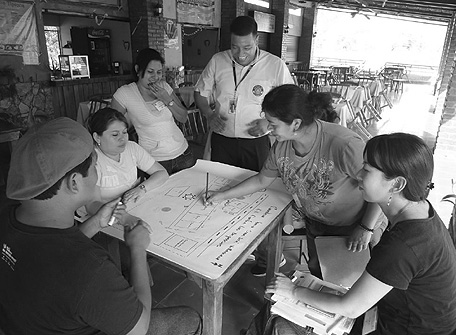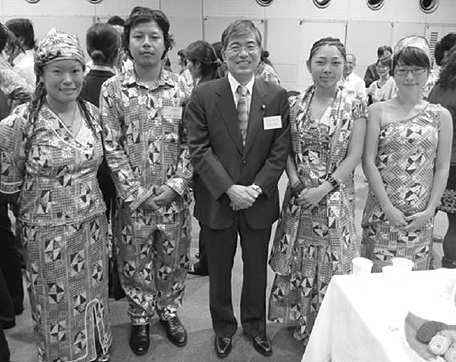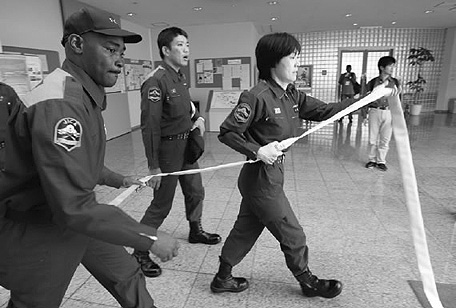Japan's Official Development Assistance White Paper 2011
Chapter 3 Reconstruction Diplomacy and ODA

Residents, municipal staff members and a Japan Overseas Cooperation Volunteer work together on a community disaster prevention map in El Salvador as part of the “Project on Capacity Development for Disaster Risk Management in Central America "BOSAI" (Photo: JICA)
Section 1 Sharing Recovery of Affected Areas and Disaster Prevention Measures with the World
To contribute to the peace and stability of the international community as much as, or even more, than in the past, Japan must of course faithfully keep the international commitments that it has already made, but it is also important that Japan shares with the world the lessons that have been learned based on the experience and knowledge gained from the Great East Japan Earthquake. In addition, Japan must also mobilize the knowledge, experience, and vitality possessed by countries overseas as it works toward the recovery and reconstruction of the affected areas in Tohoku. As Japan moves ahead with these measures, ODA is expected to fulfill a significant role.
The recommendations of the Reconstruction Design Council in Response to the Great East Japan Earthquake, issued on June 25 as "Towards Reconstruction: Hope Beyond the Disaster," establish four pillars for recovery, one of which is "open reconstruction," referring to the belief that "our nation must strengthen its bonds with the international community, and aim for reconstruction that is open to the world, rather than inward-looking." In that context, "it is necessary to share the lessons Japan has learned from this experience with other countries, making them international public property. Japan has a duty to proactively contribute to the international community in the areas of disaster prevention and reduction in this manner in the future. Japan should utilize the lessons learned during the recovery and reconstruction process, and proactively promote international cooperation that values the bonds between people, through activities such as the development of human resources in developing countries in Asia and other regions.
Reflecting these recommendations into consideration, the Ministry of Foreign Affairs will, incooperation with JICA, promote international cooperation that values the bonds between people as indicated in the FY2011 Priority Policy Issues for International Cooperation released on June 27. Specifically, in addition to sharing administrative experiences, Japan will expand its support for the communication of knowledge and experience related to disaster response, including measures to prevent disasters caused by earthquakes and tsunamis, and the activities of disaster relief teams, in order to share the experiences and the lessons that Japan has learned from the earthquake. Japan proposed to set up a "Disaster Management Network for the ASEAN Region" at the Japan-ASEAN Foreign Ministers’ Meeting in July 2011. Further, Japan intends to contribute in the area of offering and sharing of scholarly research among the international community related to the prevention of tsunami-related disasters.(Note 4)
To continue leading the way in global cooperation to prevent disasters, Japan also aims to host the 3rd UN World Conference on Disaster Reduction (expected to be held in 2015). In addition, Japan will host a high-level international conference that also serves as preparation for the World Conference, and share its experiences and lessons from the large-scale disasters that occur frequently around the world.
Further, Japan will utilize ODA to proactively provide developing countries with goods produced in the affected areas as part of its aid to the developing countries and contribution to the recovery of the affected areas, while taking into consideration the desires of those countries. Moreover, Japan will actively promote inspection of affected areas by foreign trainees, etc., to facilitate the transmission of accurate information, as part of measures to combat rumors. In addition, Japan will promote the acceptance of foreign trainees, etc., in the affected areas, while giving sufficient consideration to local circumstances. Japan’s policy is to implement these measures to support the industries in the affected areas and to contribute to the economy of those areas.
Further, Japan must utilize the knowledge and experience of Japanese experts involved in international cooperation in the recovery and reconstruction process. The Ministry of Foreign Affairs and JICA provided assistance to the activities of the United Nations Disaster Assessment and Coordination (UNDAC) team and the United Nations Office for the Coordination of Humanitarian Affairs (UNOCHA) beginning immediately after the earthquake occurred. Moreover, veteran Japan Overseas Cooperation Volunteers (JOCVs) and many NGOs engaged in international cooperation utilized the knowledge and experience they had gained by aiding developing countries to support the operation of evacuation centers and to assist victims in the affected areas. In the future, Japan will continue to cooperate to ensure that the knowledge and experience related to conflict and disaster relief and reconstruction assistance possessed by Japan's NGOs, veteran JOCVs, and development consultants, are fully utilized in reconstruction efforts.
Through such measures, Japan intends to effectively utilize ODA for open reconstruction with integrated partnership of the public and private sectors.

Parliamentary Vice-Minister for Foreign Affairs Toshiyuki Kato meets with Japan Overseas Cooperation Volunteers who had returned from overseas locations, at a ceremony to present letters of appreciation from the Minister for Foreign Affairs

Trainees from various countries engaged in joint firefighting training with members of a fire department in Fukuoka Prefecture (Photo: Kenshiro Imamura/JICA)
Notes:
(4) JICA collaborated with the Tohoku University Disaster Control Research Center to implement the research project "Considering Effective Approaches to Earthquakes and Tsunamis." Japan is gaining an understanding of the analysis of the damage from the earthquake and tsunami, the response to the emergency, and the review of the disaster prevention plan, and is again considering JICA's thematic guidelines "Disaster Prevention" in accordance with the experiences and lessons of the major earthquake.
